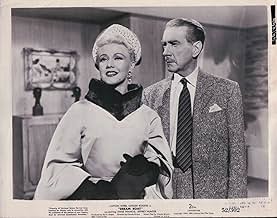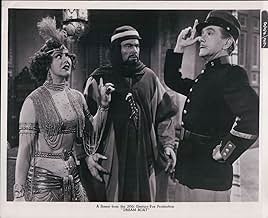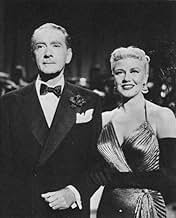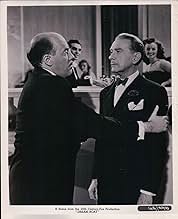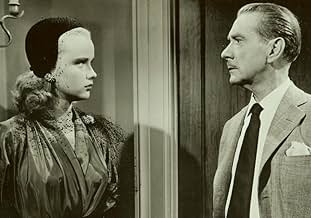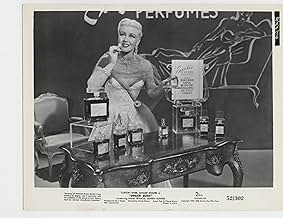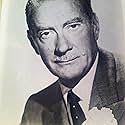IMDb RATING
6.6/10
1K
YOUR RATING
Respected college professor Thornton Sayre is plagued when his old movies are shown on TV, and sets out with his daughter to stop it. However, his former co-star is the hostess of the TV sho... Read allRespected college professor Thornton Sayre is plagued when his old movies are shown on TV, and sets out with his daughter to stop it. However, his former co-star is the hostess of the TV show playing his films, and she has other plans.Respected college professor Thornton Sayre is plagued when his old movies are shown on TV, and sets out with his daughter to stop it. However, his former co-star is the hostess of the TV show playing his films, and she has other plans.
Abdullah Abbas
- Tavern Patron
- (uncredited)
Jay Adler
- Desk Clerk
- (uncredited)
Richard Allan
- Student
- (uncredited)
Howard Banks
- Hotel Clerk
- (uncredited)
George Barrows
- Commandant in Silent Movie
- (uncredited)
Lulu Mae Bohrman
- Restaurant Patron
- (uncredited)
John Breen
- Man in Lobby
- (uncredited)
Jimmy Brooks
- Gloria's Backup Singer
- (uncredited)
- Director
- Writers
- All cast & crew
- Production, box office & more at IMDbPro
Featured reviews
When it first appeared, Dreamboat hit the mark with Sid Caesar-like precision. The old old movies were still floating around the smaller channels, and it was not unusual to find the TV screen filled with the histrionics of Valentino, Pola Negri, among others. Today, their existing work can be found, occasionally on TCM. Dreamboat was an absolute 'hoot' in its initial release, and Webb and Rogers were every bit as wacked-out funny as Caesar and Coca in a TV sketch about silent movies. Today, Deamboat may seem a little obscure, perhaps, but its broad and zany humor will still be there. One hopes that someone somewhere decides it is time to produce that elusive DVD release of this film (which includes an adorable Anne Francis, one of those underrated stars who deserves special attention).
Very witty script. I had no idea that this movie existed.
Was flipping through the TV channels and settled on AMC, a channel that no longer runs black and white social comedies from the 30's through '50s.
I was delighted and surprised to find this Clifton Webb jewel. As a mother of two younger children (one ten months) it is difficult to find movies and TV shows that entertain both children and adults. This one fit the bill.
Ginger Rogers is incredibly well cast as the woman who is all for business and Webb is quite the comic.
Was flipping through the TV channels and settled on AMC, a channel that no longer runs black and white social comedies from the 30's through '50s.
I was delighted and surprised to find this Clifton Webb jewel. As a mother of two younger children (one ten months) it is difficult to find movies and TV shows that entertain both children and adults. This one fit the bill.
Ginger Rogers is incredibly well cast as the woman who is all for business and Webb is quite the comic.
Clifton Webb made several movies before his big hit film, LAURA. He even appeared in some silent films. But, like Sidney Greenstreet (whom unfortunately he never popped up to play against in any films) his real career in motion pictures does not begin until 1944. Then it takes off...in spurts. He is a hit as Waldo Lydeckker, and then plays a carbon copy of Waldo as the villainous Cathcart in THE DARK CORNER. Then he gets the role of Elliott Templeton, the world's greatest snob, in the first version of THE RAZOR'S EDGE.
It is not until Templeton that the studio revises it's views on the talented Mr. Webb. Up till that time, Webb was seen as a sophisticated (perhaps effeminate) villain - and had played the part well twice. Templeton is villainous only in one area - he sees no future for his niece Isabel (Gene Tierney) with Larry Darrell (Tyrone Power), so when Isabel breaks with the latter Elliott encourages her to do so (using her future large inheritance from him as a lure). He also suggests she marry Gray (John Payne), a safer, more reliable husband (and a stockbroker). This may seem villainous (if you like Power's character), but he accepts it readily enough. Isabel actually is more villainous as the story progresses, getting rid of a weakened rival with truly fatal results. But Elliott just becomes a selfish, self-indulgent joke as the film progresses. In the end we welcome him for being funny (in an unintentional way). After Elliott Templeton it occurred to 20th Century Fox (and later other studios) that Webb could be a comedian - and a sharp one.
They should have realized this to begin with. Webb, in his youthful heyday of first Broadway stardom (1920 - 1940) was a leading musical comedy star. Most people seeing him today as Mr. Belvedere or as John Philip Sousa (ironically, his only musical film part), or as the doomed Richard Sturgis in TITANIC can't think of him as one of the best singer comedians in Broadway history - at one point the leading rival to Fred Astaire! His decision to make STARS AND STRIPES FOREVER in 1953 destroyed the one opportunity he would have had to strut his musical comedy talents on celluloid. Vincent Minelli hoped he'd play Geoffrey Cordova, the "Renaissance Man of the Theatre" in THE BAND WAGON. He would have played with Astaire. Instead the film has British musical comedy star Jack Buchanan in the role.
What he might have been like as a silent film comic actor (or even dramatic actor) is hard to say. He only has one surviving modern film which tackles this issue. In 1952 he played Bruce Blair, once the partner with Gloria Marlowe (Ginger Rogers) in a series of silent romantic dramas. Their partnership is like that of Ronald Colman and Vilma Banky, who made about five films together in the late 1920s. Blair left movies at the end of the silent period - tired of the grind, and wanting to teach literature at college (where the superior Webb would gravitate too naturally). He is using his real name, Thornton Sayre, as his professorial name. He is there with his daughter, and a seemingly quiet academic life. Then all hell breaks lose - Gloria has been hired to be the hostess of a television series showing their old popular movies. And they are a hit. But they have made his students, fellow academe, and the head of the college (a hopelessly adoring Elsa Lanchester) recognize Sayre for whom he actually was.
The plot has Webb trying to bring legal action to prevent the showing of the films (particularly as ridiculous sound effects and rewritten message cards advertising products are making him look idiotic). Gloria backed by her agent/producer (Fred Clark) fight this, and Gloria - in trying to vamp Bruce - remembers how she did like him years ago but lost him to another woman. All of which leads to a final courtroom showdown.
The whole film is funny, but the best bits were Webb overacting (in the silent film method) in the silent films he made, such as a World War I aviation epic, which ends with a crash (but he's still able to kiss his beloved Rogers in his trademark triple arm kiss - they are in a clinch at the fade out of the silent film). There is also a priceless scene where an angry drunk in a bar starts a fight with Webb for accidentally turning on his wife. Webb, no physical pushover here, watches the physical wrestling throws of twenty five years earlier on the television screen, and repeats them on the drunk!
The problems with misused silent films bugged many retired film figures in the early days of television. Stan Laurel was angry at the butchering of his comedies for commercials (it ruined well planned timing for gags). So the film actually does show a situation that existed in early television. It also partly answers the question of what Webb would have been like in an earlier age of movies.
It is not until Templeton that the studio revises it's views on the talented Mr. Webb. Up till that time, Webb was seen as a sophisticated (perhaps effeminate) villain - and had played the part well twice. Templeton is villainous only in one area - he sees no future for his niece Isabel (Gene Tierney) with Larry Darrell (Tyrone Power), so when Isabel breaks with the latter Elliott encourages her to do so (using her future large inheritance from him as a lure). He also suggests she marry Gray (John Payne), a safer, more reliable husband (and a stockbroker). This may seem villainous (if you like Power's character), but he accepts it readily enough. Isabel actually is more villainous as the story progresses, getting rid of a weakened rival with truly fatal results. But Elliott just becomes a selfish, self-indulgent joke as the film progresses. In the end we welcome him for being funny (in an unintentional way). After Elliott Templeton it occurred to 20th Century Fox (and later other studios) that Webb could be a comedian - and a sharp one.
They should have realized this to begin with. Webb, in his youthful heyday of first Broadway stardom (1920 - 1940) was a leading musical comedy star. Most people seeing him today as Mr. Belvedere or as John Philip Sousa (ironically, his only musical film part), or as the doomed Richard Sturgis in TITANIC can't think of him as one of the best singer comedians in Broadway history - at one point the leading rival to Fred Astaire! His decision to make STARS AND STRIPES FOREVER in 1953 destroyed the one opportunity he would have had to strut his musical comedy talents on celluloid. Vincent Minelli hoped he'd play Geoffrey Cordova, the "Renaissance Man of the Theatre" in THE BAND WAGON. He would have played with Astaire. Instead the film has British musical comedy star Jack Buchanan in the role.
What he might have been like as a silent film comic actor (or even dramatic actor) is hard to say. He only has one surviving modern film which tackles this issue. In 1952 he played Bruce Blair, once the partner with Gloria Marlowe (Ginger Rogers) in a series of silent romantic dramas. Their partnership is like that of Ronald Colman and Vilma Banky, who made about five films together in the late 1920s. Blair left movies at the end of the silent period - tired of the grind, and wanting to teach literature at college (where the superior Webb would gravitate too naturally). He is using his real name, Thornton Sayre, as his professorial name. He is there with his daughter, and a seemingly quiet academic life. Then all hell breaks lose - Gloria has been hired to be the hostess of a television series showing their old popular movies. And they are a hit. But they have made his students, fellow academe, and the head of the college (a hopelessly adoring Elsa Lanchester) recognize Sayre for whom he actually was.
The plot has Webb trying to bring legal action to prevent the showing of the films (particularly as ridiculous sound effects and rewritten message cards advertising products are making him look idiotic). Gloria backed by her agent/producer (Fred Clark) fight this, and Gloria - in trying to vamp Bruce - remembers how she did like him years ago but lost him to another woman. All of which leads to a final courtroom showdown.
The whole film is funny, but the best bits were Webb overacting (in the silent film method) in the silent films he made, such as a World War I aviation epic, which ends with a crash (but he's still able to kiss his beloved Rogers in his trademark triple arm kiss - they are in a clinch at the fade out of the silent film). There is also a priceless scene where an angry drunk in a bar starts a fight with Webb for accidentally turning on his wife. Webb, no physical pushover here, watches the physical wrestling throws of twenty five years earlier on the television screen, and repeats them on the drunk!
The problems with misused silent films bugged many retired film figures in the early days of television. Stan Laurel was angry at the butchering of his comedies for commercials (it ruined well planned timing for gags). So the film actually does show a situation that existed in early television. It also partly answers the question of what Webb would have been like in an earlier age of movies.
This delightful spoof is pure joy, elevated by a spanking story (by John D. Weaver) deft direction and scripting (by Claude Binon) and cracking cast (headed by Clifton Webb and Ginger Rogers).
What's great is that this comedy doesn't pretend to be anything more than what it is: an amusing trifle with nifty observations about the film, television and radio industries.
One of our favorites, it's also to date (2004) not available on vhs, dvd, or shown on tv. Production Studio Twentieth Century Fox must know something we don't.
What's great is that this comedy doesn't pretend to be anything more than what it is: an amusing trifle with nifty observations about the film, television and radio industries.
One of our favorites, it's also to date (2004) not available on vhs, dvd, or shown on tv. Production Studio Twentieth Century Fox must know something we don't.
Clifton Webb at his most stuff-shirtish is the life of this takeoff on swashbucklers and television commercials. Even today these eerily seem to foreshadow the commercials still shown (only usually in color.) with their pointless animations and annoying voices uttering gross exaggerations.
Ginger Rogers, here without Fred Astaire, proves herself quite a good farceuse as Webb's nemesis, Anne Francis is good as Webb's daughter and Jeffrey Hunter, some years before playing Jesus in "King of Kings" (also known humorously as "I was a Teenage Jesus" because of his youthful looks, even if he was close to the right age) played opposite Miss Francis.
Other reliable character players included Elsa Lanchester, Fred Clark and Ray Collins.
The film was brilliantly directed by Claude Binyon from his own sharp script based on a story by John D. Weaver.
Ginger Rogers, here without Fred Astaire, proves herself quite a good farceuse as Webb's nemesis, Anne Francis is good as Webb's daughter and Jeffrey Hunter, some years before playing Jesus in "King of Kings" (also known humorously as "I was a Teenage Jesus" because of his youthful looks, even if he was close to the right age) played opposite Miss Francis.
Other reliable character players included Elsa Lanchester, Fred Clark and Ray Collins.
The film was brilliantly directed by Claude Binyon from his own sharp script based on a story by John D. Weaver.
Did you know
- TriviaThe scenes at the end which are supposedly from Bruce Blair's "new" movie are actually scenes from Bonne à tout faire (1948), the first of Clifton Webb's Mr. Belvedere trilogy. The theater marquee correctly identifies the film as "Sitting Pretty", blurring the line between real-life actor Clifton Webb and his actor character Bruce Blair in this film.
- GoofsWhen Miss Marlowe's cab arrives at her "real" hotel after she leaves the flophouse, the headlights are off (probably to reduce glare), but when the angle changes the lights are back on.
- Quotes
Gloria Marlowe: You ungrateful, untalented hypocrite.
- ConnectionsFeatures Bonne à tout faire (1948)
- SoundtracksYou'll Never Know
(uncredited)
Music by Harry Warren
Lyrics by Mack Gordon
Performed by Ginger Rogers and others at the nightclub
- How long is Dreamboat?Powered by Alexa
Details
- Runtime
- 1h 23m(83 min)
- Color
- Aspect ratio
- 1.37 : 1
Contribute to this page
Suggest an edit or add missing content


